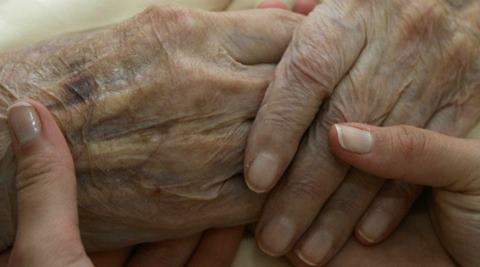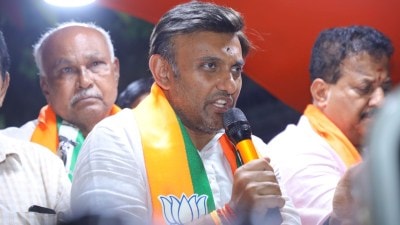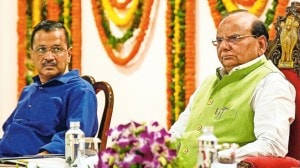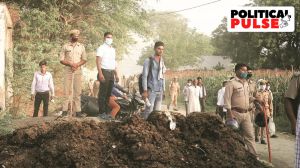- India
- International
National health programme for the elderly yet to pick up pace
The programme was launched due to the international commitments India had made with the United Nations as well as the National Policy on Older Persons adopted by the government.
 Vimla Lanjekar, in Ramnagar village of Gadchiroli, suffers from paralysis, diabetes and blood pressure problems. At 66, she has been bed-ridden since two years. (Representational image)
Vimla Lanjekar, in Ramnagar village of Gadchiroli, suffers from paralysis, diabetes and blood pressure problems. At 66, she has been bed-ridden since two years. (Representational image)
DESPITE being launched four years ago, lack of funds and the paucity of enough health workers on the ground have caused the central government’s National Programme for Health Care of the Elderly (NPHCE) to get a slow start in six districts of Maharashtra. Senior officials at the Directorate of Health Services (DHS) have blamed the policy change of the BJP-led government from 75:25 funding ratio between central and state government to 60:40 ratio last year as one of the reasons for the programme failing to keep up pace. With the policy change, the already cash-strapped state government has not been able to increase its funding for various programmes under the health department.
In 2015-16, at the training session targeted for 3,269 officials such as doctors, nurses, ASHA workers, laboratory technicians, physiotherapists and social workers for specialised care of senior citizens, only 131 were trained, that too only in Amravati. At present, there are a few health workers on ground but they are already overburdened with other programmes.
In other districts —Chandrapur, Gadchiroli, Bhandara, Wardha and Washim — no training session could be carried out. Wardha and Washim had a target to train 302 and 806 health staff respectively, of whom none were trained last year. In Bhandara and Chandrapur also, not even a single training session has happened since the programme began.
“Geriatrics is not a specialised branch but training is necessary to understand how to tackle and refer old patients for heart ailments, blood pressure and diabetes,” said Dr Kamaxi Bhate, attached with the Brihanmumbai Municipal Corporation (BMC) in Mumbai. The NPHCE is following the footsteps of a palliative programme that struggles with similar issues such as no funds, no trained support staff and lack of awareness. In 2010, Ministry of Health and Family Welfare launched the NPHCE with an objective “to provide separate, specialised and comprehensive healthcare to senior citizens at various level of state healthcare delivery system, including outreach services”.
The programme was launched due to the international commitments India had made with the United Nations as well as the National Policy on Older Persons adopted by the government. However, the state government is far from meeting the objective. Vimla Lanjekar, in Ramnagar village of Gadchiroli, suffers from paralysis, diabetes and blood pressure problems. At 66, she has been bed-ridden since two years. No one in family has been able take her to nearest hospital, 10 kms away.

The post for medical officer in her taluka is vacant. With no training for elderly care, medical social workers have only been able to give her medicines for BP and diabetes. Physiotherapy service to help her walk again continues to lag. ”No doctor is ready to work in Gadchiroli,” medical social worker Rahul Kankanalwar said. He has received no increment in salary in the last two years and no training. In fact, he pays for old patients’ travels from his own pockets.
Maharashtra has an estimated one crore population of senior citizens aged beyond 60 years. The state was sanctioned Rs 3.6 crore for setting up a geriatric centre at JJ Hospital and Rs 8.6 crore between 2010 to 2013 by Centre for training and recruitment of staffers. The programme picked pace only in 2013-14 when funds from both central and state governments were released somewhat on time. Before and after that the steam evaporated. Patient admissions dropped down to 15,247 in 2016 from 23,208 in 2013 in six districts. The programme was also supposed to expand in phases each year. It is only this year that seven more districts have been included. “The recruitment, training and establishment of geriatric wards is underway,” a DHS official said.
Data accessed from state health department shows that between April 1 and August 31 this year, 24,842 senior citizens have been referred for physiotherapy. However, specialised training has been provided to only 11 rehabilitation workers in the six districts over the last four years. In Wardha and Washim, there are only eight rehabilitation workers who continue to await even short-term training since 2012. The most common health problem senior citizens face are non-communicable diseases such as blood pressure problems, hypertension, and cardiac ailments.
As many as 66,594 senior citizens were diagnosed with the three diseases, 15,581 cases of communicable disease such as tuberculosis have also been diagnosed. “The gvernment is starting these programme to treat such diseases but there is no monitoring whether it is running well,” a medical officer in Wardha said. While under the NPHCE, weekly OPD for geriatrics in public health posts and bi-weekly in community health centres are available, most bed-ridden older patients are unable to walk to these centres. In the last five months, 200 senior citizens have already died in government hospitals. No record of deaths of those at home are maintained.
Apr 27: Latest News
- 01
- 02
- 03
- 04
- 05








































